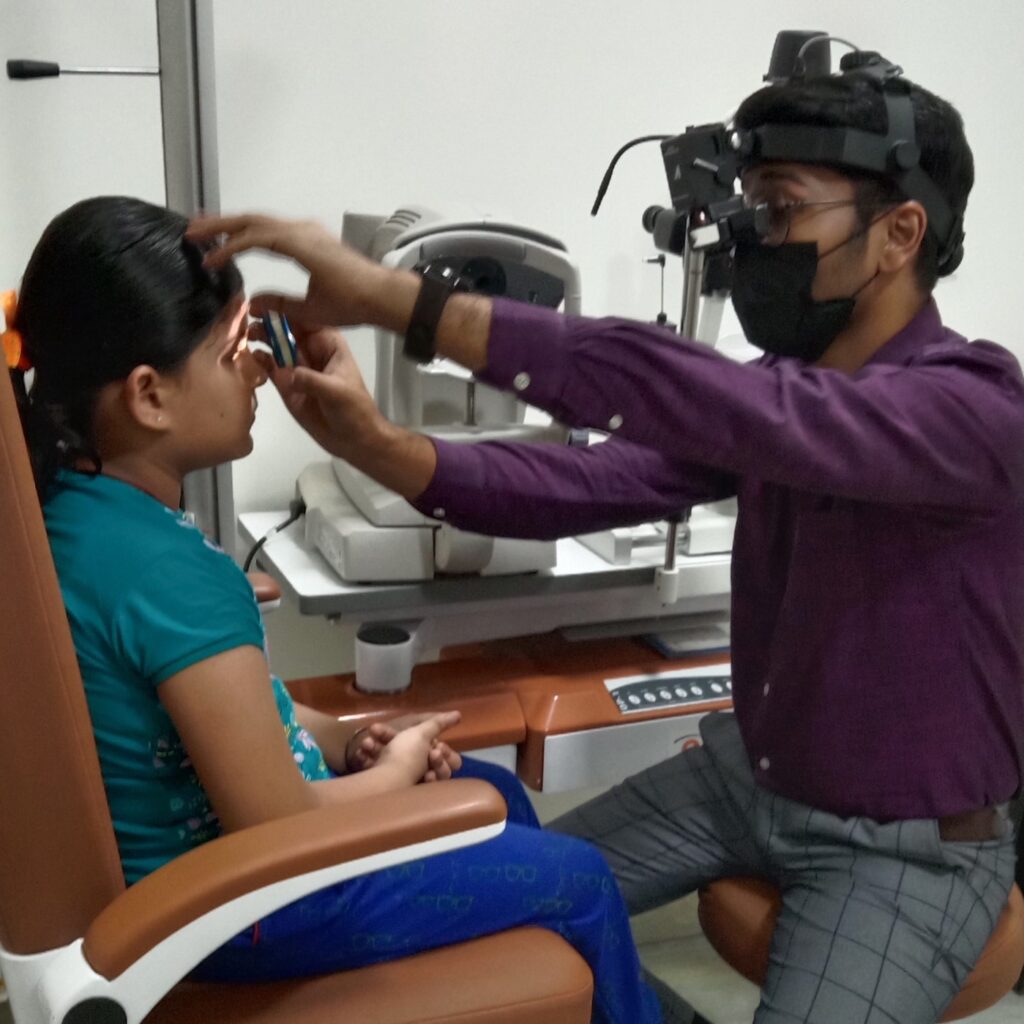
Our eyes are our windows to the world, allowing us to experience the beauty and wonder around us. From reading a cherished book to appreciating a breathtaking sunset, a clear vision is essential for a fulfilling life. Yet, in our busy schedules, eye health often takes a backseat. This blog aims to shed light on the importance of regular eye check-ups, debunk common myths, and empower you to take charge of your eye health.
Understanding Good Eye Sight and 20/20 Vision
Having good eyesight is more than just seeing clearly at a distance. It encompasses a combination of factors like:
- Visual acuity: Sharpness or clarity of vision, often measured using a Snellen chart (Vision Chart).
- Depth perception: Ability to judge the distance of objects in three dimensions.
- Color vision: Ability to distinguish different colors.
- Peripheral vision: Seeing objects on the sides without moving your eyes.
The term “20/20” or “6/6” vision refers to normal visual acuity. At this standard, you can clearly see a specific letter size at a distance of 20 feet (or 6 meters). While achieving 20/20 vision is a goal for many, it’s important to remember that good eye health goes beyond a single number on a chart.
Why Regular Eye Check-ups Are Essential
Think of regular eye check-ups as preventive maintenance for your eyes. Here’s why they are crucial:
- Early Detection of Eye Conditions: Many eye diseases, such as glaucoma, cataracts, and macular degeneration, develop gradually without early symptoms. Regular exams enable eye doctors (ophthalmologists) or optometrists to detect these conditions early, allowing for prompt treatment and potentially preventing vision loss.
- Monitoring Vision Changes: Our vision can naturally change over time due to age, lifestyle habits, or underlying health conditions. Regular check-ups allow your eye doctor to monitor these changes and update your glasses or contact lens prescription if needed. This ensures you always have the correct correction for optimal vision, reducing eye strain and discomfort.
- Promoting Overall Eye Health: Eye exams are not just about vision correction; they assess the overall health of your eyes. Your doctor will check for signs of infections, inflammation, or other abnormalities that, if addressed early, can prevent complications and maintain long-term eye health.
Beyond the Eye Chart: What Happens During a Check-Up?
A comprehensive eye exam goes beyond simply reading an eye chart. It typically involves a series of tests to evaluate various aspects of your eye health, including:
- Sharpness of your vision (visual acuity): This test helps us see how well you see at different distances, near and far.
- Need for glasses or contacts (refraction): This helps determine the right prescription for clear vision, whether it’s glasses or contacts.
- Eye teaming (eye coordination): This checks how well your eyes work together as a team.
- Eye pressure (glaucoma screening): This painless test measures the pressure inside your eye, which can be an indicator of glaucoma, a leading cause of vision loss.
- A dilated eye exam: This allows a peek behind the scenes, examining the retina (the light-sensitive layer at the back of your eye) and the optic nerve for signs of conditions like diabetic retinopathy or age-related macular degeneration.
Eye Care for Everyone: From Children to Adults
Regular eye check-ups are important for everyone, regardless of age. Here’s a breakdown:
- Children and Teens: Let’s not forget the little ones! Regular eye exams are crucial for children and teenagers too. Vision problems can hinder their learning and development. Early detection of issues like nearsightedness or lazy eye allows for prompt treatment and ensures their vision develops properly.
- Adults: Regular exams are essential for monitoring vision changes and detecting eye diseases that can develop with age.
- Adults with Risk Factors: Individuals with diabetes, a family history of eye disease, or those who spend a lot of time in front of screens may require more frequent check-ups.
Eye Exercises: Complementing Regular Check-Ups
While regular eye exams are essential, incorporating simple eye exercises into your daily routine can further support good eye health. These exercises can help strengthen eye muscles, improve focusing ability, and reduce eye fatigue:
- Blinking: Blinking regularly helps lubricate your eyes and prevent dryness.
- Near-Far Focusing: Shift your focus between a near object (like a pen) and a distant object (like a painting) several times.
- Eye Rolls: Gently roll your eyes in clockwise and counter-clockwise directions.
Taking Charge of Your Eye Health
By prioritizing regular eye check-ups, you can:
- Maintain good vision and eye health throughout your life.
- Detect and treat eye conditions early, potentially preventing vision loss.
- Reduce eye strain and discomfort.
- Ensure you have the appropriate corrective lenses for optimal vision.

The bottom line? Regular eye exams are an investment in your overall well-being. They help detect and manage vision problems and eye conditions early on, preserving your precious gift of sight for years to come. Don’t wait until you experience problems – prioritize your eye health and schedule your next eye exam today! Your eyes will thank you for it.
Don’t wait until you experience vision problems to schedule an eye exam. Make eye care a priority and take proactive steps towards a lifetime of healthy vision. Contact our friendly team at VIEW CARE in Delhi to schedule your comprehensive eye exam today!
Additional Tips for Eye Health:
- Maintain a healthy lifestyle: Eat a balanced diet rich in fruits and vegetables, and don’t forget to exercise regularly.
- Protect your eyes from the sun: Wear sunglasses that block UVA and UVB rays.
- Practice good digital hygiene: Take breaks from screens, adjust screen brightness, and maintain proper posture.
- Perform simple eye exercises: Regularly blinking and focusing on near and distant objects can help strengthen eye muscles and reduce fatigue.


